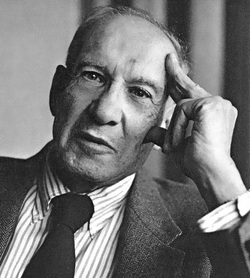
From an interview with Peter Drucker on December 20, 1991, in Claremont, California. Peter Drucker (1909 – 2005) at the time of this interview was Clarke Professor of Social Science and Management at Claremont Graduate University.
Drucker said he met Juran in the late 1940s, early 1950s. For a while they shared a management training session for the American Management Association. According to Drucker, they remained in close contact.
Here Drucker talks about his relationship with Juran, what brought them together, what he appreciated most about Joe Juran.
PETER DRUCKER: . . . what brought us together, I think, was that both of us shared the conviction that management deals with people -- and that the job of management is make human strength productive and human weaknesses irrelevant. That's my formulation, but I think he would say very similarly.
But (he has an) incredible ability to meld basic values and very specific action. And (the) impact he has on people. I don't think anybody who ever worked with him has ever forgotten the experience. Oh -- it's the respect for people he has, (it was the) fundamental humanity of the man. And, at the same time . . . totally, uncompromising on principles. Joe is just not going to do anything that is not right. It's got to be right. But it's got to fit the person.
Joe doesn't say: this is what you do, and you do it my way, and there is only one way, and that's my way. Joe says: what do you need to do and what is the best way for you to do it, it's got to fit you . . . Joe diagnoses. Joe says: what do you really need, what are your strengths, what are your competences, what are your goals. And then let's work on making them -- making you most effective.
That unique ability to have an objective, scientific approach and the compassion, that organization and people-focused application, is his very great strength. If only because he changes the people he works with. They acquire a much bigger view of themselves, and I think that is what I appreciate the most.
My take-away:
Juran understood that leaders need to know their people, that they build the capabilities of their people starting with their strengths. I am reminded of a classic HBR article by Robert Hayes. Hayes (1985) discussed how leaders can flip the “ends-ways-means” approach to strategic planning. By knowing their people, knowing the capabilities they have, leaders can assess the strengths and weaknesses of their human resources. From this, they can determine ways or methods that flow best from their people. Finally given this analysis, they can determine the best objectives or ends to pursue. (I think this works on the level of self-analysis also. What am I good at, how can I use this talent, what should I pursue?)
For great leaders it comes down to treated people as assets – not costs. Juran clearly understood costs and the bottomline – but he valued people to reduce costs and improve quality -- given good leadership.
R. H. Hayes (1985). Strategic planning – forward in reverse? Harvard Business Review, 63 (6), 111-119.
Image of Peter Drucker: http://www.flickr.com/photos/jeffmcneill/5789354033/ under license http://creativecommons.org/licenses/by-sa/2.0/deed.en
 RSS Feed
RSS Feed